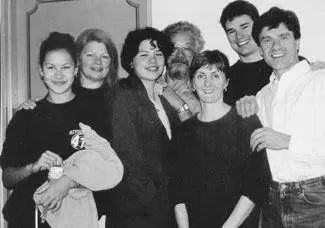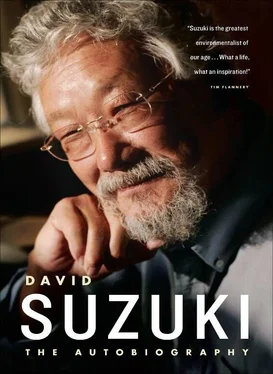In 1988, while preparing for the radio series It's a Matter of Survival , I had interviewed Gore when he was visiting Canada, and he sent shivers up my spine as he answered my questions; I had never heard a politician state the environmental situation so clearly, and he articulated the solutions that were needed to overcome the problems. At the end of the interview, I turned off the tape recorder and begged him to immigrate to Canada so that I could work to get him elected prime minister.
Then I asked more seriously, “How can journalists like me help politicians like you?” His answer surprised me and put me on the path I have followed to this day. He said, “Don't look to politicians like me. If you want change, you have to convince the public there is a problem, show them there are alternatives, and get them to care enough to demand that something be done. Then, every politician will trip over himself trying to get on the bandwagon.” Watching Gore perform as a presidential candidate in 2000, I felt the prescience of his advice to me. He didn't talk about the environment during his campaign because the American people weren't ready for it.
I had read Gore's book when it came out. It was a powerful document that I found very moving because he considered the environmental challenges from the standpoint of his Christian faith, parenthood, and politics. He didn't separate them into different areas but folded them together to come up with an integrated outlook and response. He pointed to the problems as he had encountered them as a journalist and politician, considered the implications as a parent and religious person, and outlined a program to respond to the threats, one that was both politically and economically sound. Upon his arrival in Kyoto, the environmental NGOs flocked around him as he brokered a deal with the EU countries. I later met an American environmentalist who had criticized Gore and the administration of U.S. president Bill Clinton for being too slow and too cautious, and he had been punished by being excluded from any further access to meetings with Gore. That's politics.
Much to the disgust of the private U.S. lobbyists, Gore settled for a target of a 6 percent reduction in greenhouse gas emissions by 2010. This was in 1997. Even if he had succeeded Clinton as president for two terms, he wouldn't be in office when the United States would be held to account for achieving the target, so it could be suggested he had nothing to lose by advancing the deal. Environmentalists hailed Gore as the savior of the Kyoto Protocol, which was signed by the attending delegates and would become law pending ratification by enough nations.
At the time, I was deeply disappointed because I knew Gore understood the implications of global warming and knew that deeper cuts were needed. In his book, he had called for massive investments in more efficient use of fossil fuels and in developing alternative energy sources, so a 6 percent cut seemed too trivial. But thinking now about the enormous lobbying pressure, I see his brokerage of an actual cut as a major step. The deal allowed Australia a huge concession — it would be the only industrialized country permitted to set an emissions target above 1990 levels (8 percent). All the others were expected to come in below that level.
I have never understood the Australian plea for special dispensation. Canada has the longest marine coastline of any country in the world, but the entire boundary of Australia is ocean, and the first consequence of warming of the oceans is expansion — sea levels will rise as warmer water expands, and the impact on Canada and Australia will be immense. Canada, as a northern country, could complain that its energy needs are greater than those of other countries because of the cold climate, but Prime Minister Jean Chrétien ratified the Kyoto target in the knowledge that 70 percent of the public wanted it.

David Suzuki Foundation gang at Kyoto. Left to right : Sarika, Tara, Severn, Me, Catherine Fitzpatrick, Ted Ferguson, and David Hocking.
Whenever I land in Australia, I am always struck by the fact that the country has vast amounts of something Canadians would love to have more of — sunlight. Yet driving through the cities of the nation, one has to look very hard to see a solar panel anywhere. In many poor tropical countries, water barrels on top of houses or stands are simply heated by the sun. How can Australia justify opposition to Kyoto when all of its hot water could be provided by free, nonpolluting sunlight? With its vast desert expanses, Australia should be harvesting sunlight with immense solar collectors, developing innovative ways to exploit this resource, and finding markets for solar technology. It is disgraceful that John Howard, the prime minister, has sided with the United States, and theirs are the only two industrialized nations refusing to abide by what is now an international treaty.
Will Kyoto make a difference? Many opponents of Kyoto, including U.S. president George Bush, have argued that its fatal flaw is the exclusion of the developing nations, especially India and China, as signatories. It's an argument that doesn't hold water.
If India and China follow our path of profligate energy use and pollution, no matter what the rest of the world does, the ramifications will be overwhelming. But we cannot compel them to take a different path if we do not show that we recognize the problem and are acting to reduce the hazards. If we don't set the example, we will have no moral credibility with other countries that look to us as role models. And finally, Canada (and especially the province of Alberta), Australia, and the United States are among the richest jurisdictions on Earth. If we argue that acting to minimize the hazards of climate change is too expensive, when will we be able to afford to act? And if we don't change our ways, why should India, China, Brazil, or Indonesia behave any differently?
THE FINAL AGREEMENT AT Kyoto was completed late at night on the last day of the meeting. As delegates blearily congratulated each other, few could have anticipated the challenges that lay ahead. The Kyoto Protocol would not come into effect until individual countries comprising a total of at least 60 percent of the world's population had ratified it. The ratification process would take years, and Canada, for one, had called for “voluntary compliance” to meet the target, even though experience already indicated this would never work. The private sector always opposes government regulation and, when pressured, promises to work things out voluntarily — but it never works. In the years since Kyoto, Canada's emissions have increased steadily to a point where, if we now wish to meet the goal, emissions will have to be cut by 32 percent. Hurricane Katrina revealed the folly and cost of ignoring the advice of experts, and Canadians should demand that our so-called leaders weigh scientific and technological advice far more heavily than the yelling of economists and industrialists.
Even though Gore took credit for the Kyoto agreement finally being adopted, he knew it would not pass through the United States Congress. When he ran for the U.S. presidency in 2000, he hardly talked about the environment at all. Upon election as president, George W. Bush quickly indicated he would not support the ratification of Kyoto. Since the largest energy user (and polluter) refused to consider reducing emissions, it was difficult to get the rest of the world to ratify the protocol.
As the United States' largest trading partner and foreign source of energy, Canada was under enormous pressure not to ratify. After Prime Minister Jean Chrétien went ahead and ratified the Kyoto Protocol in December 2002, I was thrilled to receive a letter in January 2003 thanking the foundation for making it possible for him to do so. His letter concluded: “Your personal efforts and those of your foundation have been an important part of the consultation process and have also contributed to informing Canadians about the issues.”
Читать дальше



![David Jagusson - Devot & Anal [Hardcore BDSM]](/books/485905/david-jagusson-devot-anal-hardcore-bdsm-thumb.webp)









